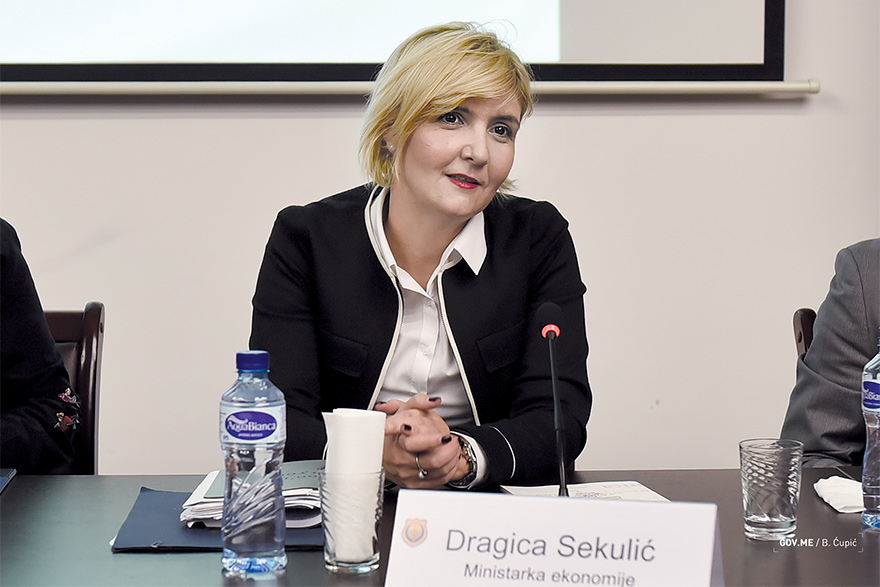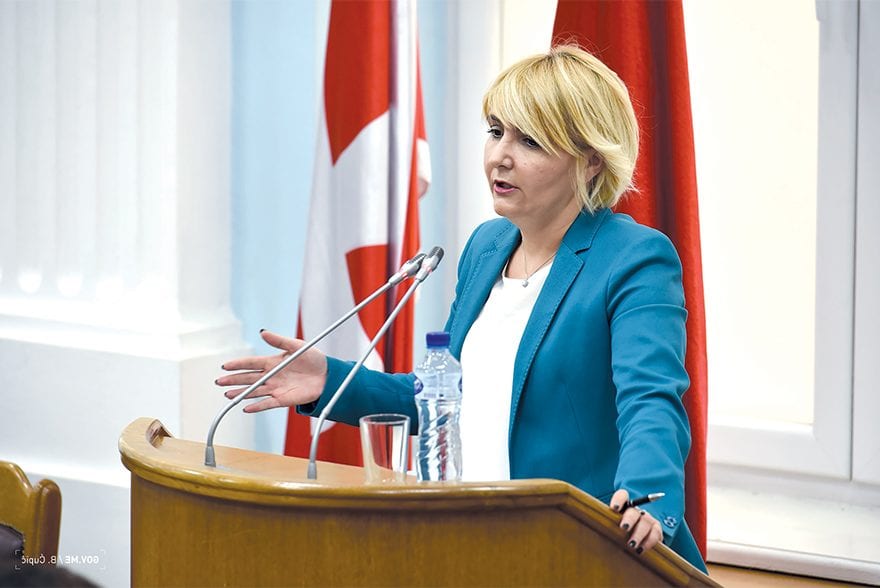Montenegro is already, to a significant degree, behaving and acting in accordance with what is expected of a (future) EU member state, in the expectation that it will utilise the period until accession in the right way to prepare for membership
The Government of Montenegro is continuously building the country as an attractive investment destination, with the aim of attracting large investors, and confirmation that Montenegro really is a safe destination for investment is provided by stable progress on the road to the European Union and the country recently joining NATO.
Montenegro has made significant progress in the past year with regard to several negotiating chapters that relate to your sector. What does this progress mean specifically when it comes to the institutional framework and practise?
When it comes to negotiating chapters in the Ministry of Economy, Montenegro this year closed one chapter temporarily (Chapter 30 – External Relations) and opened one chapter (Chapter 1 – Free Movement of Goods), which I consider as being extremely important steps in the entire negotiation process.
Through the coordinated work of a large number of officials in various institutions of the system, the Ministry of Economy has done a tremendous amount of work when it comes to these two chapters and their opening or closing is confirmation that the Montenegrin market is increasingly prepared to become part of the EU market.
According to announcements of the European Commission President, Montenegro and Serbia could be the first new EU member states among the countries of the Western Balkans. How prepared is the domestic economy to be ready for such a big change in a relatively short time?
The path to the EU is equally as important as the membership itself because it is during negotiations that all the changes that are the reasons we are seeking to become full members take place. And the entire negotiating process represents a kind of preparatory period for the economy in terms of what is expected from joining the Union, given the fact that with membership in the EU trade policy is taken on in its entirety. I consider that actually entering the EU itself will be confirmation that our economy was ready to accept, or rather has already accepted, what is brought by the membership.
In this context, how do you assess the competitiveness of the domestic economy within the European framework, and which EU Member States are your role models?
Montenegrin companies, but also entrepreneurs generally in the Western Balkan region, have been able to improve their business today more than ever.

When I say this, I’m thinking of the fact that Montenegrin businessmen have the possibility of utilising state assistance that we provide through various support programmes, and then a significant number of them use and take advantage of EU pre-accession funds and, finally, today more than ever businesspeople have the possibility to interconnect. This last point is perhaps the key when it comes to competitiveness in European frameworks.
Today, in these times of globalisation, the issue of connectivity is crucial. However, in order to enable trade and economic integration, we must create all the prerequisites for high-quality infrastructure connectivity in the areas of transport and energy. That is why we are initiating and advocating stances, above all, on regional connectivity that will contribute to the greater competitiveness of our economy within the European framework.
As for the role models you mentioned, it is healthiest to observe individual elements within each of the economies of EU countries and to strive to take on that which is compatible with your economy. The experiences of Slovenia and Croatia are extremely valuable to us.
What are the key measures of the government and ministries when it comes to strengthening the sector of the domestic economy and what kind of feedback do you receive from businessmen during the Business Caravan?
The Ministry of Economy has been implementing numerous economic support programmes for many years, and this year we decided that the Business Caravan would be a way for us to better familiarise businesspeople with the opportunities for support that we offer. Alongside that, for the next year’s budget, we plan to support the economy with €2 million intended for direct investments, the development of clusters, the introduction of innovations and international standards in operations and the modernisation of industry and for the business zone project.
Tax reforms don’t bring new burdens on the economy, rather, on the contrary, we are considering the possibility of reducing the burden of income tax
Montenegro has shown in the previous period that it is an interesting destination for attracting new investors. To what extent are investors who already do business here satisfied with the business environment and what do you do in order to encourage them to reinvest?
We are continuously building Montenegro as an attractive investment destination, with the aim of attracting large investors, and confirmation that Montenegro really is a safe destination for investment is our stable road towards the European Union and the country recently joining NATO.
Foreign investors who operate in Montenegro know that they have a credible partner in our state and we intend to maintain such a reputation and further improve it by creating an even more competitive business environment.

Montenegro has one of the most competitive tax systems in the region: the corporate tax rate of nine per cent is at the lowest level in the region. In addition to this, the Government has created numerous financial and technical support programmes for domestic and foreign businesspeople, which are realised on the principle of subsidies, refunding part of funds or exemptions, or reducing charges and taxes – depending on the programme itself.
The most favourable incentives at present are based on the Decree on incentives for direct investments, which enables financial incentives for new investments directed towards the creation of new jobs, especially in less developed areas of Montenegro.
Funds for investment incentives, which range from €3,000 to €10,000 per new employee, are distributed on the basis of a submitted application in response to a public advertisement that we announce annually, and that applies for investment projects with an investment value ranging from €250,000 to €500,000, depending on the region, and which provides for the employment of at least 10 to 20 newly employed persons within a deadline of three years from the date of the conclusion of the contract on the use of funds with the Government of Montenegro.
For capital investments with a value exceeding €10 million and which provide for the creation of jobs for at least 50 new employees within a deadline stipulated in the contract on the use of funds for stimulating investments, incentives can be awarded for a value of up to 17 per cent of the total value of the investment project, without the implementation of a points-scoring procedure.
Continuing with the challenges currently confronting the economy, how have fiscal consolidation measures impacted on the country’s economic dynamism?
It has been shown that the economic policy measures of the Montenegrin Government have yielded very good results on the economic and developmental fronts in the past year. The expected real growth of the Montenegrin economy exceeds the planned level significantly; in the first six months, we recorded growth of 4.2%, while 2.7% had been planned. In the second quarter alone, growth was an impressive 5.1%, which is one of the highest rates in Europe.
What is very important is that even in the period of demanding fiscal consolidation, which implied increasing the rates of certain taxes, we succeeded in retaining the competitiveness of our tax system and we work to ensure the measures implemented are in no way detrimental to the operations of businesspeople.
In your opinion, will Montenegro be in a position to maintain relatively high GDP growth rates despite policies of saving and to what extent do the major infrastructure projects you are implementing contribute to this dynamic?
Real GDP growth of 4.2% generated in the first half of the year, which, as I said, exceeded even our own expectations, was greatly stimulated by the more intensive implementation of works on the construction of large infrastructure projects, and here I’m primarily referring to the construction of the highway, local infrastructure and tourist capacities.
We are in constant communication with businesspeople, because that’s the only way we can know where additional efforts should be exerted for the investment environment to be even better
Additionally, a record tourist season, or significant growth in tourism, had a major impact on the real growth of the Montenegrin economy. On the basis of results achieved and current estimates, we expect real GDP growth to total four per cent by the end of this year, while next year we expect real GDP growth of three per cent. As has been the case to date, growth will be based on large investment projects in strategic sectors of our economy.
After a long period of uncertainty, it is now clear that Italian company A2A, which – after the state – is the largest shareholder of Electric Power Industry of Montenegro (EPCG), is withdrawing from the ownership of this company. What precisely does this mean for this company and Montenegro’s energy sector?
The change in the ownership structure EPCG in no way changes the fact that this company was and remains a pillar of the Montenegrin electro-energy system and that it has enough expertise in its structure to lead development policy in the field of energy.
Notwithstanding the fact that the entry of Italian company A2A into the ownership structure of EPCG in 2009 had positive effects for Montenegro, or for its energy and economic sectors, I consider that EPCG is today an enterprise that can independently, or in some new partnership if such a decision is taken, successfully carry out strategic policies in the field of energy.
How much progress has been made on the project to construct the second block of the Thermal Power Plant in Pljevlja?
Negotiations for the implementation of this project are continuing and in the upcoming period we expect the Steering Committee for Project Design to be determined according to the offered technical-financial-legal aspects of Škoda Prague and General Electric, and in accordance with that define further activities and alternatives.
Regardless of the ongoing negotiations, the current state of the electrical energy sector can undoubtedly develop through the economically and ecologically justified use of coal and electricity production in the Pljevlja area, and we will enable that not only through the construction of a new production facility, but also through certain investments in the existing Block I.
A question was recently raised over whether acceptance of the Paris Agreement on Climate Change calls into question the reconstruction of the existing block and the construction of a new block at this thermal power plant. What do your figures show?
The Paris Agreement does not exclude or prohibit signatories that are largely EU members from realising the full value of their thermal energy potential, but rather only requires the use of such technologies that will minimise the negative impacts of thermal energy.
The creation of the new production facility in Pljevlja will provide a tangible contribution in the joint fight against the negative impacts of climate change by gradually eliminating the negative impact of existing ways of utilising coal and working in accordance with the highest European standards when it comes to environmental protection.
| CREDIBILITY
Foreign investors who operate in Montenegro know that they have a credible partner in our state and we intend to maintain such a reputation and further improve it |
RESPONSIBILITY
Our basic aim is to enable our economy, through the fulfilling of obligations contained in every chapter, to adequately prepare for everything that awaits it on the European market following accession |
EFFICIENCY
Our goal is to reduce the budget deficit by implementing fiscal reforms and to enter into a budget surplus by as early as 2020 |
|---|